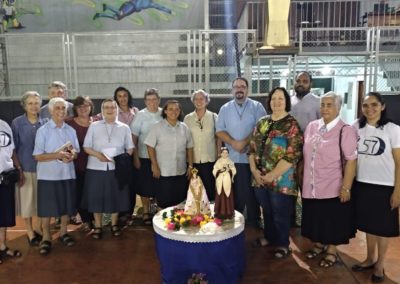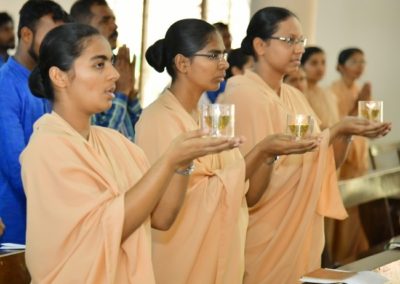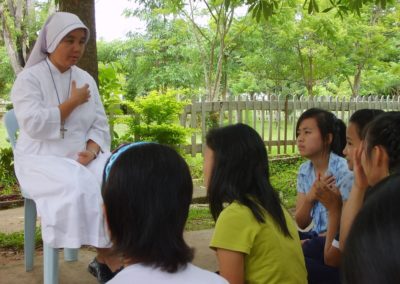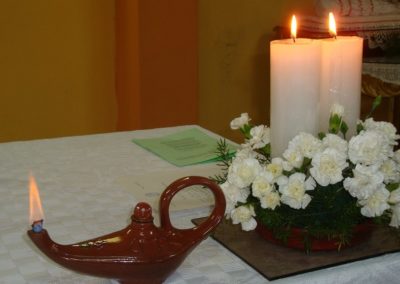Humble Offering
The light which Bartolomea received and expressed by the vow of charity and which she spelled out in the founding project of the Promemoria led her on to write what has been described as the “highlight page”: in it she paid the highest tribute to God’s initiative in this undertaking. She drew it up in the 20-21 November night, 1832, as she stayed up praying just before the founding of the Institute.
Her passionate love for charity–at-work, which had induced her to take that step, now demanded of her a total self-emptying, after the manner of the Crucified Lord, the assuming of the attitude with which he laid down his life for our sake: the humility of the cross.
Next morning she was to go and start the Institute with no wishes of her own but still waiting to get on that new day some indication of his will.>
Abridged text.
(For full italian text see in pdf).
Here I am, most lovable Jesus: I have reached, at last, the longed-for moment of my sacrifice. Today, through the hands of Mary, I have the happiness to consecrate myself wholly and irrevocably to your glory in service of my neighbour.
In this occasion, you are my only support. I know I am unfit, unworthy, incapable of anything; but if it be your will, you can make me accomplish marvellous things. I do not know what I am going to do; I simply promise you that I will do gladly, without any objection or reasoning, all that I am commanded by those who hold your place for me. and I will do it cheerfully, willingly and with real pleasure.
I have no longer anything of my own, I am wholly yours, and yours in the manner that pleases you most. I pledge myself right from now to desire nothing except you, your Cross, your Will, and the good of my neighbour.
I present my Mother as a gift to you; you know how much I love her, and how much it costs me to leave her. I pray you to be of help and comfort to her.
I offer you my sister; take special care of her, make her a great saint.
I recommend to you all my relatives, I entrust to you all my friends, I pray you for all my benefactors: help them and save them all.
I return to you all the possessions, however meagre, that you have given me, that they may be used for the benefit of my neighbour. I have always been poor, and from now on I shall willingly be extremely poor.
I pray and beseech you, however: assist me by your grace, grant me all necessary virtues, preserve in me always a joyous heart, trust and reliance on you, never on myself, union with you, and a holy courage in every deed that concerns your glory.
Dear Jesus, I recommend you our House. I hope for great graces and much help from you. I beg you not to leave me too long without your company; grant that a Chapel be built, and if a miracle is needed for it, I ask it of you.
I also beg from you another companion, but she must be after your own Heart.
Lastly: I am ready to sacrifice everything, I want nothing else; I will do and suffer all that is pleasing to you; above all, I unite myself to you in everything. I shall act, think, speak and suffer, and even breathe, with you.
Most Blessed Virgin Mary, take my humble offering, unite it to your own most precious offering (1) and render it pleasing to your Jesus, enriching it to its fullest with your protection and help.
Dear St Aloysius, protect our Institute, pray continually for me and for my companions.
(1) It was the Feast of the Presentation of Mary at the Temple:
21 November 1832
The challenges of our times which in their very contradictions hide a deep yearning for religiosity, together with the Church’s appeal to promote a spirituality of communion, induce us to live up to our charism by cultivating a timely dialogue of charity in our relations with those we meet and serve through the works of mercy in accordance with our apostolic project.
With this aim in mind, we draw on our womanly resources and on values of internationality and interculturality that characterize our Institute.
We live by this gift of communion first of all in our fraternal life as sisters who partake of the same founding charism and share spiritual and material goods, and as disciples of Jesus ever on our way together, sustained by merciful love for one another.
The increased internationality of the Institute is for us a source of richness impelling us to welcome and value cultural diversities and committing us to tackle calmly any limits or difficulties that dialogue involves.
Made capable, by grace, of reciprocity and communion among ourselves, we strive to carry on a dialogue of charity in our apostolic service: we do this by fostering a sense of universal brotherhood in Jesus the Redeemer, remaining in solidarity with the poor and going through a process of inculturation, without which we cannot be true neighbours today. This demands that we be discerning, willing to learn from what is different and to develop a readiness for collaboration in Church and in society, effecting an exchange of gifts that is typical of genuine service.
True to our identity as consecrated persons committed to follow Jesus the Redeemer, who for our sake took the “form of a servant” and wanted us all to be one in himself, we strive to promote a culture of solidarity and to foster a spirituality of communion in the ecclesial and human family, so that all may live as God’s children in the Father’s household.





